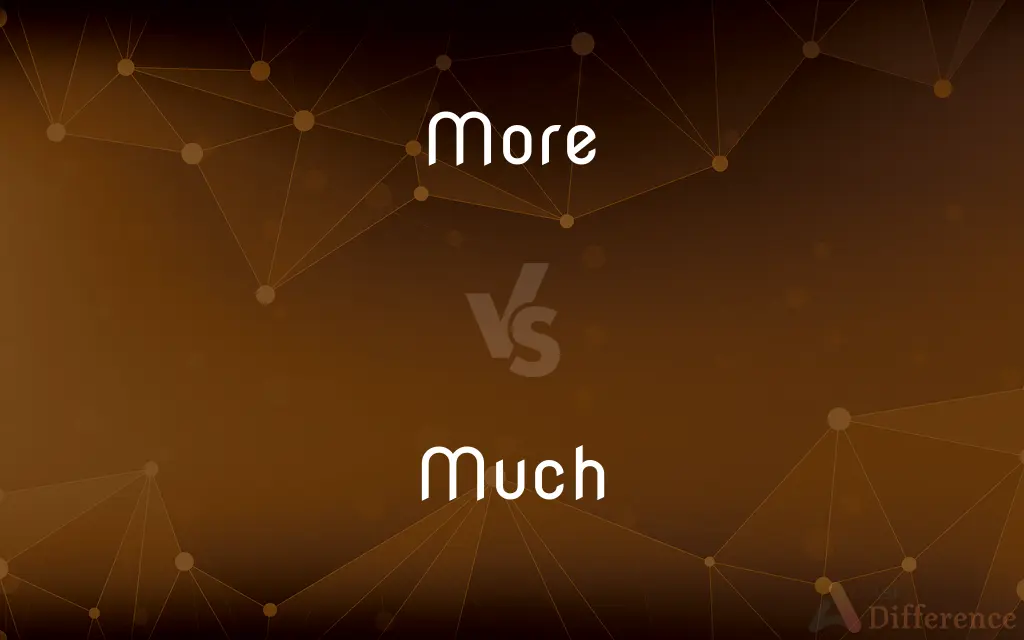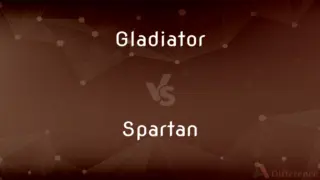More vs. Much — What's the Difference?
By Tayyaba Rehman — Updated on October 5, 2023
More" is a comparative modifier for both countable and uncountable nouns. "Much" is primarily used with uncountable nouns to indicate a large amount.

Difference Between More and Much
Table of Contents
ADVERTISEMENT
Key Differences
More" and "Much" are both quantifiers in the English language, helping to express the quantity of something. While they sometimes overlap in their functions, there are distinct rules governing when and how each should be used, making them unique in their own right.
"More" stands as a comparative term and can be used with both countable and uncountable nouns. When "More" is employed, it usually indicates an additional or greater quantity or degree of something in comparison to another. For example, "She has more books than him" and "I need more water" showcase the word's versatility with both types of nouns.
On the other hand, "Much" specifically targets uncountable nouns, pointing to a large quantity. It's commonly found in negative statements and questions. Phrases like "I don't have much time" or "How much sugar do you want?" aptly capture its primary usage.
However, there's a note of caution. While "Much" may be used in affirmative statements, it's more typical in formal contexts or when emphasizing a significant amount. For instance, "Much has been said about the topic" sounds formal and emphasizes the extensive discussion on the subject. "More", being more versatile, doesn't carry such limitations and easily fits into various contexts.
In sum, while both "More" and "Much" serve to quantify, "More" has a broader range, fitting both countable and uncountable nouns, whereas "Much" narrows its focus mainly to uncountable nouns and finds frequent usage in questions and negatives.
ADVERTISEMENT
Comparison Chart
Type of Nouns
Used with both countable and uncountable nouns.
Primarily used with uncountable nouns.
Common Usages
Comparative situations and general statements.
Questions, negative statements, and formal affirmatives.
Example with Count
"She has more pencils."
N/A
Example with Uncount
"He needs more water."
"He doesn't have much water."
Formal Usage
Fits both formal and informal contexts without emphasis.
Used in affirmative statements in formal contexts.
Compare with Definitions
More
Additional or further.
Would you like more coffee?
Much
Often or a lot.
It doesn't rain much here.
More
To a greater extent.
He's more interested in music than sports.
Much
Nearly, approximately.
The project is much as it was a year ago.
More
Beyond a certain point.
The task will take more than an hour.
Much
A large amount
I didn't get much sleep that night
They must bear much of the blame
I did so much shopping
He does not eat much
More
Greater in number
A hall with more seats.
Much
A large amount
I didn't get much sleep that night
They must bear much of the blame
He does not eat much
I did so much shopping
More
Greater in size, amount, extent, or degree
More land.
More support.
Much
To a great extent; a great deal
Thanks very much
They look much better
Did it hurt much?
They did not mind, much to my surprise
More
Additional; extra
She needs some more time.
Much
Great in quantity, degree, or extent
Not much rain.
Much affection.
More
A greater or additional quantity, number, degree, or amount
The more I see of you the more I like you.
Much
A large quantity or amount
Much has been written.
More
To or in a greater extent or degree
Loved him even more.
Much
Something great or remarkable
The campus wasn't much to look at.
More
Used to form the comparative of many adjectives and adverbs
More difficult.
More softly. See Usage Note at perfect.
Much
To a great degree or extent
Much smarter.
More
In addition
Phoned twice more.
Much
Just about; almost
Much the same.
More
Moreover; furthermore.
Much
Frequently; often
Doesn't get out much.
More
Comparative of many
There are more ways to do this than I can count.
Much
A large amount of.
Hurry! We don't have much time!
They set about the task with much enthusiasm.
More
Senseid|en|comparative form of much}} {{comparative of much
There's more caffeine in my coffee than in the coffee you get in most places.
Much
(in combinations such as 'as much', 'this much') Used to indicate, demonstrate or compare the quantity of something.
Add this much water and no more.
Take as much time as you like.
More
Additional; further.
If you run out, there are more bandages in the first aid cupboard.
More people are arriving.
I want more soup.
I need more time.
Much
A great number of; many (people).
More
Bigger, stronger, or more valuable.
He is more than the ten years he spent behind bars at our local prison, as he is a changed man and his past does not define him.
Much
Many ( + plural countable noun).
More
To a greater degree or extent.
I like cake, but I like chocolate more.
I could no more climb that than fly!
More advanced students.
I have more than carried out my obligation.
I have no complaints and no more does my mom.
Much
(obsolete) Large, great.
More
Used to form the comparative form of adjectives and adverbs.
You're more beautiful than I ever imagined.
Much
(obsolete) Long in duration.
More
In negative constructions: any further, any longer; any more.
Much
To a great extent.
I don't like fish much. I don’t much care for strawberries either.
He is much fatter than I remember him.
He left her, much to the satisfaction of her other suitor.
That boyfriend of yours is much {like - the same as} the others.
My English was much the worst, and I'm certainly not much good at math either.
Honestly, I can't stand much more of this.
Both candidates, who are much of an age, say much the same thing, but the youngest shows much the commoner behavior of the two.
More
Used in addition to an inflected comparative form.
I was more better at English than you.
Much
Often; frequently.
Does he get drunk much?
More
A greater number or quantity (of something).
We're running out of napkins. I should have bought more.
There isn't enough salt in this. You need to add more.
Much
(in combinations such as 'as much', 'this much') Used to indicate or compare extent.
I don't like Wagner as much as I like Mozart.
More
An extra or additional quantity (of something).
There aren't many people here yet, but more should be arriving soon.
Much
(obsolete) Almost.
More
Comparative of many
Last year’s applications received from new and returning students were more than each of the previous four years.
Much
A large amount or great extent.
From those to whom much has been given much is expected.
We lay awake for much of the night.
More
Comparative of much
Much
Great in quantity; long in duration; as, much rain has fallen; much time.
Thou shalt carry much seed out into the field, and shalt gather but little in.
More
(obsolete) A carrot; a parsnip.
Much
Many in number.
Edom came out against him with much people.
More
(dialectal) A root; stock.
Much
High in rank or position.
More
(dialectal) A plant; flower; shrub.
Much
A great quantity; a great deal; also, an indefinite quantity; as, you have as much as I.
He that gathered much had nothing over.
More
(transitive) To root up.
Much
A thing uncommon, wonderful, or noticeable; something considerable.
And [he] thought not much to clothe his enemies.
More
A hill.
Much
To a great degree or extent; greatly; abundantly; far; nearly.
Thou art much mightier than we.
Excellent speech becometh not a fool, much less do lying lips a prince.
Henceforth I fly not death, nor would prolongLife much.
All left the world much as they found it.
More
A root.
Much
A great amount or extent;
They did much for humanity
More
A greater quantity, amount, or number; that which exceeds or surpasses in any way what it is compared with.
And the children of Israel did so, and gathered, some more, some less.
Much
(quantifier used with mass nouns) great in quantity or degree or extent;
Not much rain
Much affection
Much grain is in storage
More
That which is in addition; something other and further; an additional or greater amount.
They that would have more and more can never have enough.
O! That pang where more than madness lies.
Much
To a great degree or extent;
She's much better now
More
Greater; superior; increased;
He gat more money.
If we procure not to ourselves more woe.
Whilst sisters nine, which dwell on Parnasse height,Do make them music for their more delight.
The more part knew not wherefore they were come together.
Wrong not that wrong with a more contempt.
Much
Very;
He was much annoyed
More
Greater in number; exceeding in numbers; - with the plural.
The people of the children of Israel are more and mightier than we.
Much
To a very great degree or extent;
We enjoyed ourselves very much
She was very much interested
This would help a great deal
More
Additional; other; as, he wept because there were no more worlds to conquer.
With open arms received one poet more.
Much
(degree adverb used before a noun phrase) for all practical purposes but not completely;
Much the same thing happened every time
More
In a greater quantity; in or to a greater extent or degree.
Admiring moreThe riches of Heaven's pavement.
Much
Frequently or in great quantities;
I don't drink much
I don't travel much
More
With an adjective or adverb (instead of the suffix -er) to form the comparative degree; as, more durable; more active; more sweetly.
Happy here, and more happy hereafter.
The duke of MilanAnd his more braver daughter.
Much
A large quantity or amount.
I don't have much patience left.
More
In addition; further; besides; again.
Yet once more, O ye laurels, and once more,Ye myrtles brown, with ivy never sere,I come to pluck your berries harsh and crude.
Those oracles which set the world in flames,Nor ceased to burn till kingdoms were no more.
Much
To a great extent or degree.
His work was much admired.
More
To make more; to increase.
Much
Emphasizing the great quantity of something.
Much has been written about the event.
More
English statesman who opposed Henry VIII's divorce from Catherine of Aragon and was imprisoned and beheaded; recalled for his concept of Utopia, the ideal state
More
(comparative of `much' used with mass nouns) a quantifier meaning greater in size or amount or extent or degree;
More land
More support
More rain fell
More than a gallon
More
(comparative of `many' used with count nouns) quantifier meaning greater in number;
A hall with more seats
We have no more bananas
More than one
More
Existing or coming by way of addition;
An additional problem
Further information
There will be further delays
Took more time
More
Used to form the comparative of some adjectives and adverbs;
More interesting
More beautiful
More quickly
More
Comparative of much; to a greater degree or extent;
He works more now
They eat more than they should
More
Greater in number or size.
She has more cookies than he does.
More
Used to form the comparative of adjectives.
This puzzle is more difficult than the last.
Common Curiosities
Can "more" indicate a comparative degree?
Yes, "more" often denotes a greater degree or quantity.
Can "much" be used in positive statements?
While possible, it's more common in formal contexts or for emphasis.
Is "much" mainly for uncountable nouns?
Yes, "much" is primarily used with uncountable nouns.
Which is broader in application, "more" or "much"?
"More" has a broader application, fitting various contexts and noun types.
Is "much" often found in questions?
Yes, "much" is commonly used in questions, like "How much sugar?"
Is "more" also used as a comparative for adjectives?
Yes, for example, "more beautiful" or "more interesting."
Does "much" imply a significant amount in formal contexts?
Yes, in statements like "Much attention was given."
Can "more" indicate something beyond a certain point?
Yes, like "more than a year" or "more than I expected."
Can "much" denote frequency?
Yes, as in "It doesn't rain much here."
Is "much" often paired with "too" to indicate excess?
Yes, like "too much sugar."
Can "more" be used with both countable and uncountable nouns?
Yes, "more" can be used with both types of nouns.
Can "much" mean approximately?
Yes, as in "The cost is much the same."
Can "more" be used with adverbs?
Yes, for example, "more quickly" or "more efficiently."
Do "more" and "much" always refer to positive quantities?
No, they can denote absence or lack, like "not much" or "no more."
Is "more" also used in the sense of "again"?
Yes, as in the request "Tell me more."
Share Your Discovery

Previous Comparison
Holy vs. Holi
Next Comparison
Gladiator vs. SpartanAuthor Spotlight
Written by
Tayyaba RehmanTayyaba Rehman is a distinguished writer, currently serving as a primary contributor to askdifference.com. As a researcher in semantics and etymology, Tayyaba's passion for the complexity of languages and their distinctions has found a perfect home on the platform. Tayyaba delves into the intricacies of language, distinguishing between commonly confused words and phrases, thereby providing clarity for readers worldwide.














































